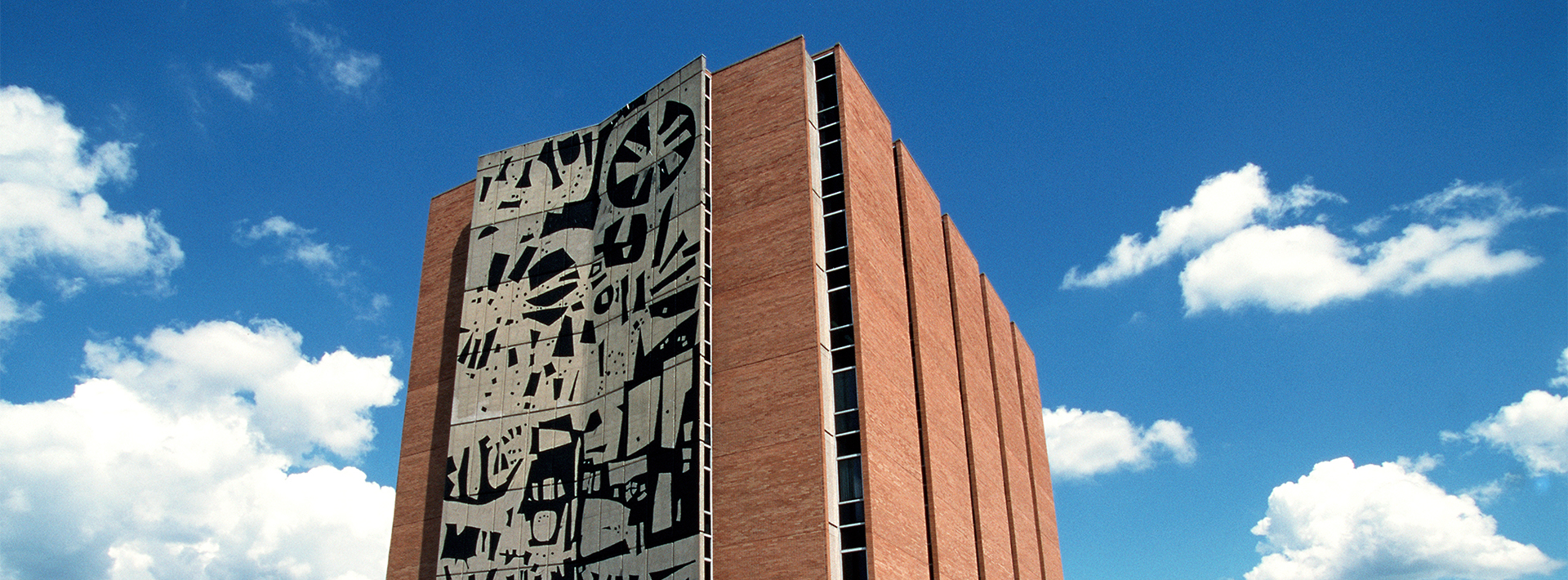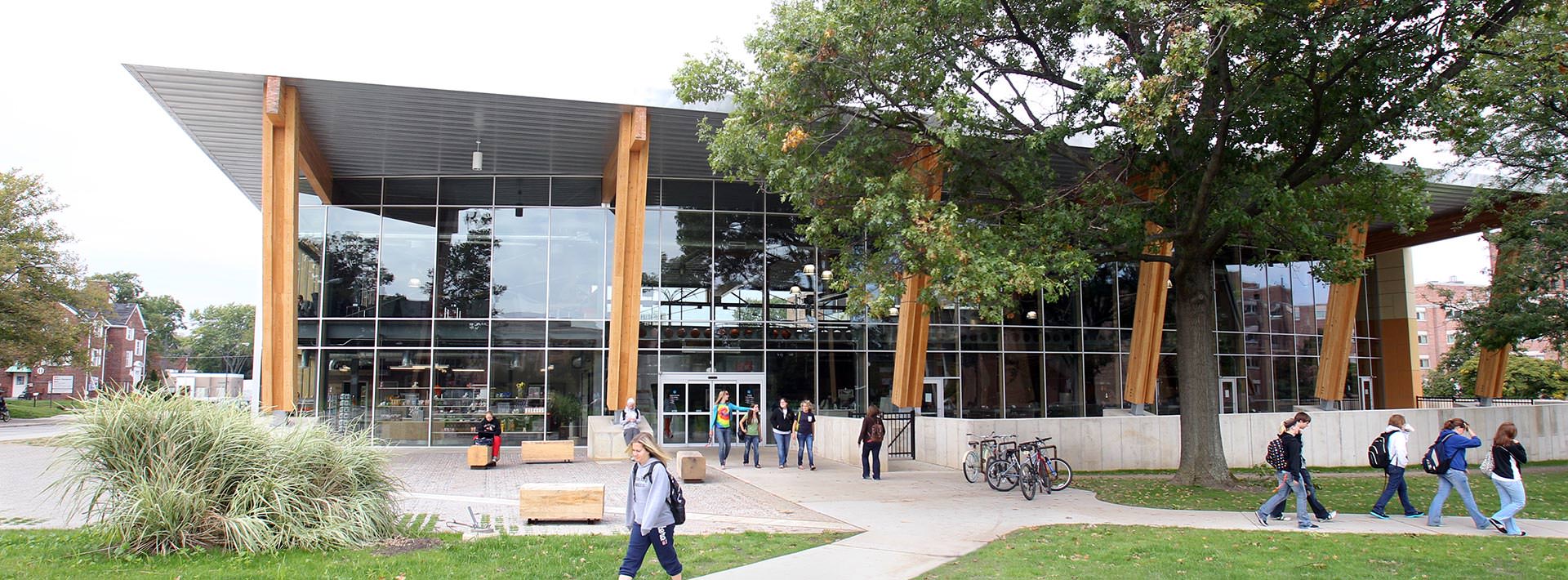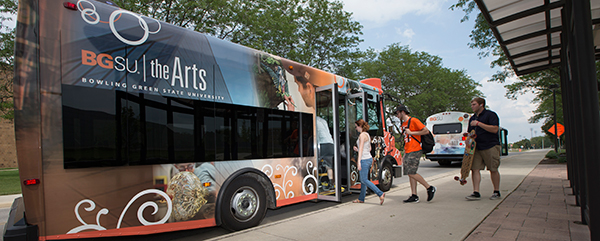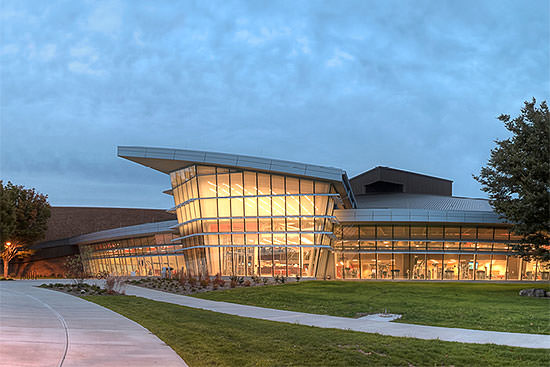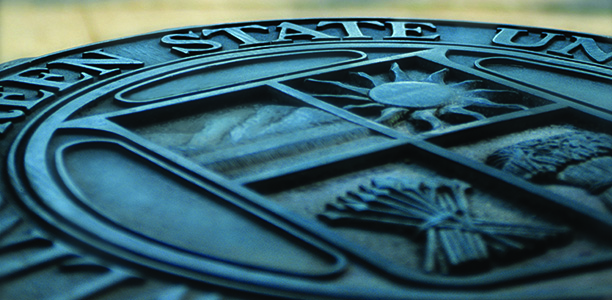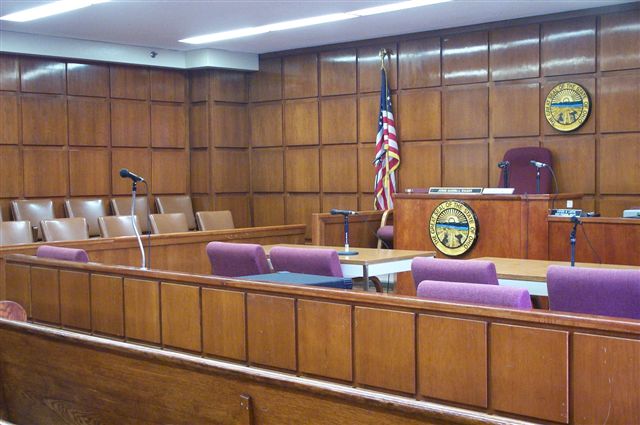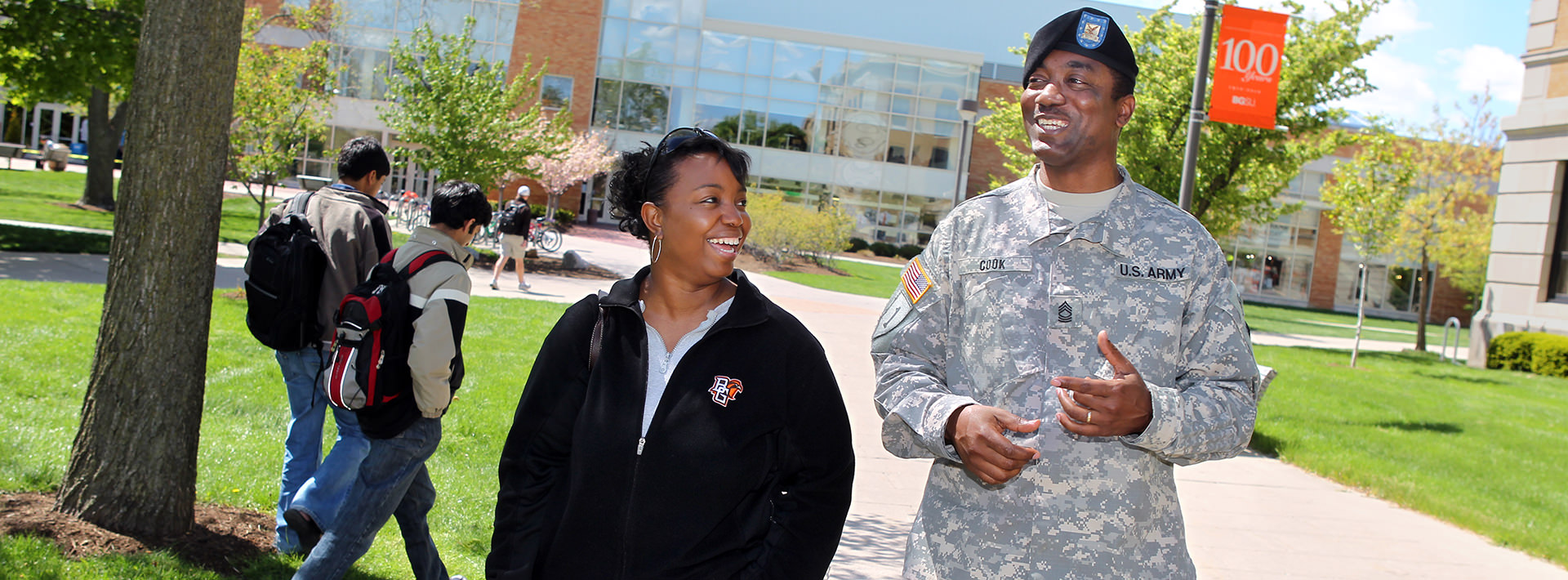Off-Campus Resource Center
- BGSU
- Off-Campus Student Services
- Resource Center
The Hazel H. Smith Lounge is located on the 2nd floor of the Bowen-Thompson Student Union, and is designated as a space for commuter students to go during the day.
Some features of the lounge include:
- Comfortable tables and chairs providing a place to study;
- Kitchenette complete with two microwaves, a sink, and a refrigerator;
- Free storage lockers to stash your books and personal belongings*;
- Current newspapers and magazines for your reading enjoyment;
- Two computer stations for checking email, MyBGSU, and other web-browsing;
- Wireless printing capabilities.
- Flyers and important information for off-campus students.
*To obtain a locker, visit the Information Desk on the first floor of the Student Union.
Wireless Printing
Wireless and remote printing is available in the Off-Campus Lounge. Using this print feature in the lounge will allow you to queue printing from anywhere on campus. You will not be charged for the printing until you release the job by entering your username and password at the release station next to the printer.
PC/Windows Users:
To access this printing feature from a PC/Windows machine, please view the ITS Knowledge Base.
Mac/Apple Users:
To access this printing feature from a Mac, please view the ITS Knowledge Base.
Any problems with the printer should be directed to the Office of the Dean of Students (372-2843) or the Technology Support Center (372-0999).
Along with some additional freedom, living off-campus comes with many responsibilities. The information below includes tips and information to help you navigate those responsibilities effectively and make living off-campus a positive experience.
Keep the quick tips below in mind if you’ve made the decision to live off-campus.
1. In shopping for a place to live, contact the Wood County Health Department at (419) 352-8402 and ask to review their file on the property you are considering renting. This file would contain any previous health-related complaints, such as mold.
2. Consider renters insurance. This may be something you need to purchase, or you may be able to add it to an existing home owner’s policy with your parents or family members.
3. To increase the likelihood of getting your full security deposit returned to you, photograph, videotape, and/or document the condition of the property when you move in and when you move out.
4. Do not agree to any oral modifications of the written lease. All modifications of the lease should be agreed upon in writing—keep a copy for your records.
5. Follow all procedures set forward by the property manager for rent payments, and if at all possible, do not pay rent in cash. If this is absolutely necessary, get a receipt from the property manager or office representative to prove you have paid.
6. Check smoke detectors monthly. Know where the fire extinguishers are and make sure they are in working condition.
7. Contact your property manager at the first sign of any problems at your property, such as neighbors, repairs needed, etc. Additionally, follow-up in writing to your property manager and document everything, keeping a copy for yourself of everything you have sent to or received from your landlord.
8. If your property manager does not complete a repair in a reasonable amount of time that affects your health or safety, or your property manager is not fulfilling his/her contract agreed upon in the lease, contact Student Legal Services for advice on an appropriate plan of action.
9. Meet all your legal obligations: keep your apartment safe and sanitary; get rid of garbage in a clean, safe, and appropriate manner; use appliances properly; prevent others from damaging your place; introduce yourself to your neighbors and respect their rights to live in a safe, quiet, and clean environment; don’t reasonably withhold consent for your property manager to enter your property.
10. Property managers must give reasonable notice, presumed to be 24 hours, to the tenant before entering the apartment (this notice does not apply in emergency situations). However, if your landlord is not providing reasonable notice, contact Student Legal Services for advice on how to remedy the situation.
11. When you move out, leave a written forwarding address for your ex-landlord to send your security deposit. Similarly, leave a written forwarding address with the Post Office and Bowling Green State University through MyBGSU.
12. Become familiar with the City of Bowling Green Zoning Ordinance and occupancy restrictions.
13. Check out the BG News Housing Guide and OCSS Facebook page for current updates!
Important Safety Information for Off-Campus & Commuter Students
Whether you are on-campus, off-campus, or traveling to or from campus, personal safety and responsibility is extremely important to your overall success at BGSU.
The list below includes several university resources available to you, as well as many other strategies that you can use to maintain personal safety. If you’re going to be out late, go with friends, stay with friends and return with the same friends.
- Use the Campus Escort Service to help you get safely home. You can call them at: 419-372-8360. Put this number in your cell phone!
- Use the Campus Shuttle Service. You can call them at: 419-372-RIDE (7433).
- Be aware of your surroundings. If you see anything suspicious, immediately call 911. If you have a cell phone, don’t wait until you get back to your room or apartment, call immediately!
- If you are involved in an incident, report it immediately. If you have a friend who has been involved in an incident, encourage them to seek assistance and report it to police.
- Attend personal safety workshops. Contact the Campus Police Department for free personal safety seminars at 419-372-2346.
- Pay attention to Crime Alerts. If you have any information that may help with a Crime Alert, call the Campus Police Department at 419-372-2346.
- Sign up for AlertBG, BGSU Text Message Alert System.
- Familiarize yourself with BGSU Emergency Procedures.
- Make sure your door has a deadbolt lock and keep your door locked at all times—even when you are at home.
- Keep emergency numbers by your phone.
- Do not put your address on your key ring.
- Do not leave keys in hiding places. Thieves will find them.
- Identify the person who is knocking before you open the door.
- Make sure that all windows on the ground level can be locked and are kept locked.
- Provide blinds or curtains for your windows and keep them drawn at night.
- Check if the smoke detector is working. Change the battery twice a year.
- Thieves know the college schedule so make your place look "lived-in".
- Tell your trusted neighbors that you'll be out of town and ask them to keep an eye out.
- Keep all windows and doors secured.
- Store electronic equipment and small valuables in a safe place.
- Contact the post office and have them hold your mail while you are away.
- Have a timer for lights so that your house looks occupied, even while you are gone.
- If your neighbors have an extra vehicle, ask if they are willing to park in your driveway.
- Keep your heat on (during the winter months) so water pipes don't break.
See it, BEFORE you sign it.
Make smart choices about where you live. Make sure there are working smoke detectors and at least two exits out of your living unit. Off-Campus fires can be fatal. Make sure you are picking a fire-safe place to live.
Other Resources:
Although you may have found a perfect place to live, do not rush to sign the lease. You should read through the lease to make sure all terms are well defined and written in clear and concise language. You have the right to edit the lease before signing.
These are some common issues that should be specified in the lease:
- The amount of rent
- The length of the rental period
- Amount of security deposit & return date
- Who is responsible for repairs
- Which repairs will be done by the landlord
- Whether subleasing is allowed, and under what terms
- When a landlord may enter your property
The bottom line is simple: Read the lease carefully BEFORE you sign it and have Student Legal Services review it for you!
Moving In
Before moving into your house or apartment, be sure to carefully inspect the unit. For a convenient inspection checklist please click here. Also, keep this checklist for when you move-out at the end of your lease.
After you’ve considered the questions and tips found online, you need to have a plan for maintaining your records and documents. Keeping accurate and complete records of your rental documents is critical. A documentation binder can serve as a central location for your materials, and is an easy solution.
Quick Move-In Tips
- Consider renters insurance. This may be something you need to purchase, or you may be able to add it to an existing home owner’s policy with your parents or family members.
- Walk through the entire unit, preferably prior to moving your furniture in, and document any and all damages/problems that you see.
- Take pictures or video-tape the unit for visual documentation of any pre-existing damages (preferably prior to moving in furniture). Document the date (at the beginning and ending of the video-taping, hold out a newspaper with the date clearly visible). Video-tape the entire unit in one taping (do not stop or pause at any time). Always keep a copy of any type of documentation for your records. Never give your only copy to anyone!
- Request repairs by sending a Notice to Repair letter to the property manager, outlining all repairs that need to be done.
- Keep a copy of all communication with your property manager.
- Be sure to discuss expectations with your roommates(s). Consider signing a contract and discuss utilities, cleaning, noise and visitor agreements.
Moving Out
Moving-out of your apartment or house can be a very hectic time, but there are a number of steps you need to take during the move-out process. Find your checklist and revisit the check-in steps above. Doing so will help ensure the quick return of your security deposit.
Quick Move-Out Tips
- Provide prior notice in writing to your property manager for when you will be vacating the premises. Some property managers require 60 days or more notice, but to find out your property manager’s policy, check your lease. Even if you have a specific end-date for your renting contract, it is still recommended that you let your property manager know of your plans for vacating your property.
- Clean your apartment/house thoroughly and make any necessary small repairs! Remember, your property manager may/can deduct money from your security deposit for damages and items not cleaned properly.
- Complete the move-out portion of your checklist. This will help you keep track of the condition your property was in when you left, and may help you if your security deposit is not returned to you fully or at all.
- Take pictures and video-tape the property as you did upon check-in.
- Return your keys to the property manager by the end of the lease contract term.
- Forward your mail. Provide your property manager with a forwarding address so he/she will know where to mail your security deposit. Also, remember to notify the US Postal Service of your new address so you can receive any final utility bills or other important mail.
Need help finding a roommate? Check the posts on the BG News Housing Guide.
Choosing a compatible and responsible roommate is as important as choosing the apartment in which you will live. This is a BIG decision and needs to be given careful consideration. There are legal, financial, and personal implications that affect people living together. Even if your best friend appears to be the perfect roommate, she or he may not live up to your expectations. If you shared a room in the dorms you already know that the person you live with can make your life fun or miserable. Living with someone off-campus can be more complicated because you will have financial and legal responsibilities to each other and no residence hall coordinator to help negotiate the rough spots. Enter into a lease with someone only after you have a clear understanding of each other’s expectations, and then remember to respect those expectations once you are living together.
Each tenant is individually responsible for all of the rent and all of the damages regardless of how the tenants have divided up the rent between themselves and regardless of who actually causes the damage. If one roommate does not pay the rent, the other roommates are liable for payment of that person’s share. Nonpayment of a portion of the rent will put ALL roommates in jeopardy of being evicted. It is up to the other tenants, not the landlord, to collect from the non-paying tenant.
One way to get some of the basic issues of sharing an apartment clarified is to create a rental agreement with your roommate/s. The purpose of a rental agreement is to set up basic guidelines at the beginning of a lease that determine the responsibilities of all roommates. You can keep disagreements to a minimum if each tenant understands his/her basic responsibilities. It is best if all roommates have signed and dated copies of the agreement.
While a roommate agreement is not binding on the landlord, it is binding on the tenants who sign it. A roommate agreement should include the following:
- The agreed dollar amount that each tenant is responsible to pay for rent. Rent may be split equally or may vary if the size and convenience of bedrooms differ.
- How utility bills will be paid and who will pay them.
- Responsibility for the security deposit or how it will be divided
- How repairs for any damage to the property will be taken care of as well as how it will be paid.
- Expectations regarding guests, academics, and study time.
Updated: 01/22/2026 03:10PM

